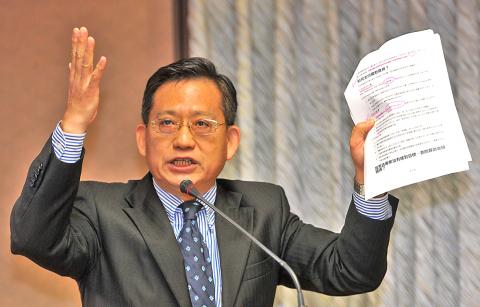A visit to Taiwan by the Dalai Lama could be considered as the Tibetan religious leader returning to China, because “Taiwan is also the land of China,” Chinese Nationalist Party (KMT) Legislator Wu Yu-sheng (吳育昇) said yesterday.
Democratic Progressive Party Legislator Chen Chih-mai (陳其邁) criticized Wu, saying that he might as well call Taiwanese legislators “members of China’s National People’s Congress.”
Wu made the remarks at a meeting of the legislature’s Internal Administration Committee to examine the budget of the Mongolian and Tibetan Affairs Commission, an agency that seems an incongruous fit for Taiwan, but still sits within the Republic of China’s institutional framework.

Photo: Liu Hsin-de, Taipei Times
During a meeting with Mongolian and Tibetan Affairs Commission Minister Jaclyn Tsai (蔡玉玲), Wu said the Dalai Lama should be welcome to visit the nation, but China’s reaction should also be taken into consideration lest his visit be interpreted as encouraging Tibetan or Taiwanese independence.
“Since both sides of the Strait belong to one China,” Wu said, a visit by the Dalai Lama to Taiwan could be considered as “a return to China,” despite the Dalai Lama being banned from setting foot in China.
“Insofar as we, the KMT, uphold the ‘one China, different interpretations’ principle, Taiwan counts as China,” the legislator said.
Wu also said that the 11th incarnation of the Panchen Lama could also be invited to visit Taiwan so he could meet with and be “recognized” by the Dalai Lama, an arrangement that “should not be opposed by Beijing.”
Chen tore into Wu’s “outrageous proposal,” saying that the present Panchen Lama was controversially chosen by the Chinese government, while the one asserted by the Dalai Lama to be the actual 11th incarnation of the Panchen Lama is said to have been imprisoned since he was six years old, in 1995, and whose situation remains unknown to the outside world.
“If [arranging a meeting between the Dalai Lama and the Beijing-appointed Panchen Lama] does not count as an insult to the Dalai Lama, what does?” Chen asked.
Chen also lambasted Wu for calling Taiwan “China,” asking the KMT legislator whether they both were members of China’s National People’s Congress (NPC) and the committee an NPC committee.
Chen then asked Tsai whether she agrees with Wu’s claim that Taiwan is “China” so a visit to Taiwan is tantamount to a visit to China, whereupon Tsai said that the question should be referred to the Mainland Affairs Council (MAC).
Wu was unhappy with Tsai’s answer, calling her timidity in “guarding the country’s Constitutional position a public official’s malfeasance.”
MAC spokesperson Wu Mei-hung (吳美紅), in response to the uproar over Wu’s remarks, said that the cross-strait relationship has always been positioned as “one Republic of China, two regions” according to the Constitution of the Republic of China and the Act Governing Relations Between the People of the Taiwan Area and the Mainland Area (臺灣地區與大陸地區人民關係條例).
This understanding of the relationship has been unchanged for 20 years and has survived three presidents, she said.

TRAGEDY STRIKES TAIPEI: The suspect died after falling off a building after he threw smoke grenades into Taipei Main Station and went on a killing spree in Zhongshan A 27-year-old suspect allegedly threw smoke grenades in Taipei Main Station and then proceeded to Zhongshan MRT Station in a random killing spree that resulted in the death of the suspect and two other civilians, and seven injured, including one in critical condition, as of press time last night. The suspect, identified as a man surnamed Chang Wen (張文), allegedly began the attack at Taipei Main Station, the Taipei Fire Department said, adding that it received a report at 5:24pm that smoke grenades had been thrown in the station. One man in his 50s was rushed to hospital after a cardiac arrest

SAFETY FIRST: Double the number of police were deployed at the Taipei Marathon, while other cities released plans to bolster public event safety Authorities across Taiwan have stepped up security measures ahead of Christmas and New Year events, following a knife and smoke bomb attack in Taipei on Friday that left four people dead and 11 injured. In a bid to prevent potential copycat incidents, police deployments have been expanded for large gatherings, transport hubs, and other crowded public spaces, according to official statements from police and city authorities. Taipei Mayor Chiang Wan-an (蔣萬安) said the city has “comprehensively raised security readiness” in crowded areas, increased police deployments with armed officers, and intensified patrols during weekends and nighttime hours. For large-scale events, security checkpoints and explosives

A car bomb killed a senior Russian general in southern Moscow yesterday morning, the latest high-profile army figure to be blown up in a blast that came just hours after Russian and Ukrainian delegates held separate talks in Miami on a plan to end the war. Kyiv has not commented on the incident, but Russian investigators said they were probing whether the blast was “linked” to “Ukrainian special forces.” The attack was similar to other assassinations of generals and pro-war figures that have either been claimed, or are widely believed to have been orchestrated, by Ukraine. Russian Lieutenant General Fanil Sarvarov, 56, head

PUBLIC SAFETY: The premier said that security would be tightened in transport hubs, while President Lai commended the public for their bravery The government is to deploy more police, including rapid response units, in crowded public areas to ensure a swift response to any threats, President William Lai (賴清德) said yesterday after a knife attack killed three people and injured 11 in Taipei the previous day. Lai made the remarks following a briefing by the National Police Agency on the progress of the investigation, saying that the attack underscored the importance of cooperation in public security between the central and local governments. The attack unfolded in the early evening on Friday around Taipei Main Station’s M7 exit and later near the Taipei MRT’s Zhongshan